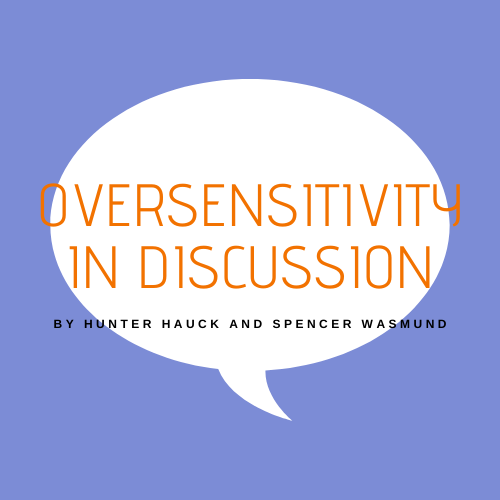Oversensitivity in discussion

For a beneficial multifaceted discussion to take place, both parties must leave their pride at the door.
October 23, 2019
So often the opinions of other people are discredited for the sake of political correctness. Whether or not something is actually offensive, an entire argument of substance can be deemed invalid if it hurts someone’s feelings.
Being offended should no longer be a viable argument against a sensible claim. For a beneficial multifaceted discussion to take place, both parties must leave their pride at the door. What we’re frequently taught is to respect the opinions of others, but that rarely ever happens because of how personally some arguments are taken. When discussing a controversial topic, it is very important to remember that the arguments aren’t against you as a person, but instead against your stance. The sooner people understand this, the easier it will be to share and defend your genuine opinions in the future.
Another reason people take great offense is because they are involved in the issue being discussed. Whether they or their friends and family are personally affected by a certain issue is also not a valid argument. Anecdotal evidence is one of the most overused arguments, something that needs to change in order to have productive conversations. Anecdotal evidence is often used to evoke sympathy and can be easily construed to fit one’s agenda. Often times, because of how personal some of that evidence is, the other person is more often than not unable to respond for the fear of being prejudice or offensive towards the other person.
The purpose of explaining what to do and what not to do in arguments or discussions is not to enable attacks on another person’s character, but instead to discourage the behavior of ad hominems. Of course, there are certain words and phrases that should never be said, but when arguing, you should get to the root of the problem and respectfully and logically work out your differences. At the same time, though people should be careful about staying away from blatantly offensive terminology, they should also shy away from looking for every possible excuse to call the other person out for being offensive.
Remain open-minded in a discussion. With the strengthening of stances and opinions, it is rare to have a discussion in which people are open-minded. If we wish to live in a world where people’s opinions can be respected and refuted in a civil manner, we must first learn to live with an open mind. You’re entitled to your own opinion and people’s feelings should also be considered in a discussion; however, the sole purpose of a discussion remains the same: find differences in opinions and respectfully defend your own while remaining open-minded.









